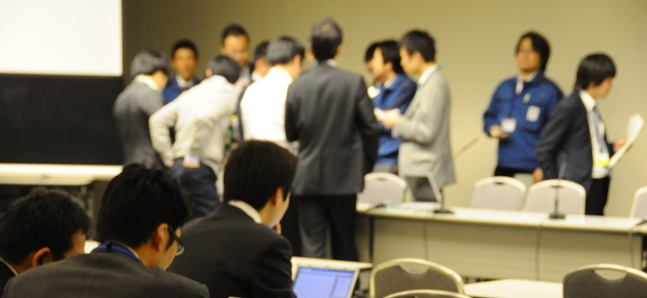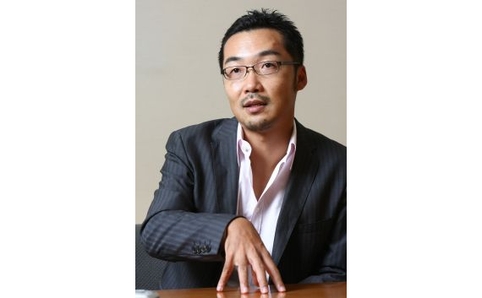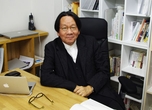
Posted: 金 4 01 2011
In the immediate aftermath of the March 11 earthquake and tsunami, the Japanese media stayed remarkably calm. While overseas news outlets fretted about nuclear meltdown and terrified expats stranded in a 'City of Ghosts', their Japanese counterparts generally hewed closer to the official line: stay calm, go about your business as usual. And, yes, you can still drink the tap water.
But that was only part of the picture. While the mainstream media presented a reasonably united front, a group of freelance and internet journalists were openly dissatisfied with the explanations being given at Tokyo Electric Power Co.'s seemingly endless stream of press conferences. Why wasn't the company mentioning levels of plutonium around the stricken Fukushima Daiichi power plant? What had happened to TEPCO's president, Masataka Shimizu – last seen on March 13?
One of the most influential members of this group of dissenters is Takashi Uesugi, a former New York Times journalist and, in an earlier incarnation, aide to Liberal Democratic Party bigwig Kunio Hatoyama. The author of books including The Collapse of Journalism, Uesugi is a vociferous critic of Japan's 'Kisha Club' system – a network of exclusive press clubs that, he says, nurtures excessively close relationships between reporters and the organisations they are supposed to cover.
Gadfly to some, hero to others, Uesugi is a much-sought commentator. He makes weekly appearances on Tokyo FM and Asahi Newstar, and is a regular contributor to the Diamond Weekly business website, along with various weekly tabloids. However, he's most prolific on his own website and via Twitter, where he commands a following of 177,000 and counting. One place place he won't be appearing any more is TBS Radio, who booted Uesugi from his regular weekly guest slot this month (more on that later).
Time Out caught up with Uesugi last Monday, during a brief lull between press conferences at the TEPCO head office in Shimbashi. We'd gone expecting to have a nice chat about tweets and microsieverts, but smalltalk apparently wasn't an option. What followed was a eye-opening, if occasionally paranoid tirade against TEPCO, the government and the mass media, delivered in rapid-fire Japanese.
Obviously a lot has happened over the past couple of weeks, but what are the main things you've learned?
Basically, something that I knew from the beginning, but has become more blatant yesterday and today [March 27-28], is this terrible situation where the government and TEPCO are suppressing information. To be more specific, I thought it was strange that there was nothing written about plutonium when the data about reactor 3 was given out at the TEPCO press conference on the 27th, so I asked them if it was true that no plutonium had been detected in reactor 3, and for how long it had not been detected. TEPCO answered: 'Plutonium hasn’t been detected.' To confirm what they were saying I asked if perhaps it wasn't that none had been detected, but that they hadn't actually taken any measurements. They were alarmed, and it turned out that it wasn't even that they hadn't taken any measurements, but that they didn't have the instruments to do so in the first place.
That's one example. Another is the question of where exactly has the TEPCO company president gone? There was a rumour doing the rounds a while ago that he had been hospitalised, when actually he had been away because of fatigue. This time they're using the pretence of hospitalisation for the same situation. All of it's lies. It's emblematic, isn’t it? [Note: TEPCO president Masataka Shimizu was hospitalised on March 29, and subsequently resigned.]
Two weeks ago I told someone in the government that TEPCO was lying. I called a friend from back when I was a governmental aide directly on their mobile phone and said that the government was being deceived, but I didn't get any response at all. On top of that, even though I was able to attend the Chief Cabinet Secretary’s press conferences before the earthquake, after the quake, all the freelance journalists, foreign media and Internet reporters were kicked out. So I took on the role of representative for those media outlets, and tried to negotiate by constantly badgering the official residence – like a stalker – saying, ‘If you don’t let in the foreign media too, there won’t be any way for information to be conveyed abroad, will there?’
Ever since the [nuclear] trouble started, I’ve been saying again and again via the different media and radio programs that I appear on that TEPCO are concealing things about the accident, that they're lying, and that the government is being fooled. I’ve been saying that TEPCO is a client of the media and the press clubs, being one of their biggest advertisers – so the press won’t be able to say certain things, and will be holding back, won't they? But then, at the end of one of the programs, the producer came to me and asked me to stop doing the show at the end of the month, and I was dropped. When I criticized TEPCO on a different program, they also wanted to get rid of me. But the producer of that particular program is a strong person, and actually went ahead and did it without a sponsor.
TEPCO are such an important advertiser that the television and newspapers are completely silent. Even now, they're running TEPCO commercials on the television, aren’t they? This week, there are also full-page advertisements in the newspaper. Despite the fact that they've caused such a scandal, TEPCO are still putting ads in the newspaper. If they have such enormous sums of money, they should send it to the areas hit by the disaster.
It's like the false announcements made by the Imperial General Headquarters 70 years ago [during World War II] are happening all over again. I’m shocked that something I've seen in history textbooks, and had thought was completely implausible, is happening right before my eyes. I never thought that I'd become a party to anything like this. [Laughs]

Have you been following reports in the foreign media, then?
Yes, all the time.
Would you say that they've been overdoing it?
No, I wouldn’t, because the foreign media was just reporting what was possible. I think the correct way to report about the events at the nuclear power plant is to assume the worst case and write about it, and then also add what the current situation is in relation to that. Newspapers and television shouldn't say, 'Don't worry, it's safe. You don't need to run away,' like Japan's have. There's absolutely no problem with the way the foreign media has covered this news. It's not fanning people's fears if we report by saying it's possible for things to reach such and such a point, but at the moment the situation is like this, so you don't need to worry. There's also nothing wrong with the foreign media referring to the examples of Chernobyl and Three Mile Island. After clarifying the source, I have also talked about those kinds of things in my email newsletter and in my regular reports for websites, as well as on radio shows and satellite TV programs where I'm a regular guest. Except recently, the more I talk about those topics, the more complaints I get after the program has finished – in incredible numbers. People say things like, 'Don't lie!' or 'It's safe!' But they've got no grounds to say that. Japanese people want to believe that it's safe, don't they? They just don't want to look at how things really are. It's like an ostrich burying its head in the sand.
We've read a lot of opinions from scientists recently, and the majority of them seem to fall in line with what the government's saying: that this isn't another Chernobyl, and Tokyo isn't at risk from radiation…
That’s because at the moment, any scientists who say that the current situation is dangerous are being removed from the mass media. Ultimately, the most dangerous situation is one where the only information available is what suits the government and TEPCO. From the outset, the mass media haven’t been using the people who are reporting that the worst possible outcome could happen. And yet the evacuation area was changed from 2km to 3km, and then to 10km, and to 20km, and finally to 30km. America has specified a 50 mile (80km) evacuation zone, but Japanese people still say that things are OK as they are...
Then the next week I said [to Chief Cabinet Secretary Edano], ‘You were wrong, weren’t you? Radioactive material has been found in the area outside the 30km line, and even though you said radioactive material would never reach Tokyo, it has, hasn’t it? The government is responsible for the consequences of what it says so you should make a proper apology. Correct your mistakes.’ He replied, ‘That is not the case.’ When I said that, far from being within the 30km radius, radioactive material was found 40km away, and that he should correct the mistake, he told me to ‘Submit that properly in writing.’ I asked a question in the middle of a press conference, and he actually told me to put it on paper. [Laughs] At that point I just couldn’t believe it any more. It’s the first time that has ever happened to me – to be asked to submit a question in writing in the middle of actually asking it. Basically, it’s hopeless, isn’t it? Something in the minds of the government has burst.
When The New Yorker interviewed you recently, you talked about how the Japanese public were 'brainwashed' by the media. Can you tell us a bit more about that?
From a young age Japanese people become convinced that newspapers and the television are correct, and that magazines and the Internet are full of lies. But the information in the newspapers and on the television is just what the government is giving out through the press clubs. Even if it's different from the information and data that reporters have gathered themselves, they just accept what the government announces. So the people here who think that the newspapers and television are right always believe the information given to them, and it’s why the same kind of brainwashing is happening now too. But one thing that's a little different from how things have been up until now is that people, mostly the younger generation, are starting to realise what's going on, and using the Internet to say, ‘Hang on, there’s something that’s not right, isn’t there?’ Even my Twitter timeline has been incredible since this morning, with messages like, ‘What the newspapers and television are saying is not the truth!’ It’s just like Egypt and Tunisia. That’s where we can clearly see changes happening.
Tags:
Tweets
- About Us |
- Work for Time Out |
- Send us info |
- Advertising |
- Mobile edition |
- Terms & Conditions |
- Privacy policy |
- Contact Us
Copyright © 2014 Time Out Tokyo














Add your comment